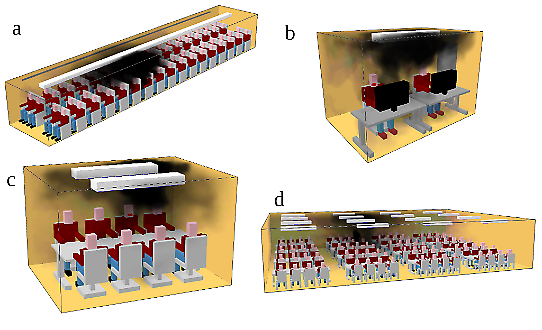Disease such as Covid-19 and influenza, are caused by viruses spread by small respiratory droplets from the respiratory tract. Small aerosol particles can cause medium distance transport of viruses. In an insufficient ventilated indoor environment, this can lead to an elevated infection risk that increases with the virus concentration in air, and with the exposure time.
This raises several questions on measures to control the indoor transmission. We conduct a comparative study with an aerodynamic model, where we simulate four different indoor environments during a typical office working day; (a) public transportation, (b) shared office spaces, (c) a meeting room, and (d) a lunch restaurant. For each situation, we model aerosol transmission and deposition on airway epithelium, for different breathing manoeuvres, emission, and ventilation scenarios.

Comparison of the results shows that variations in emissions are the primary cause of variations in aerosol concentration, deposition and infection risk. Furthermore, room volume, exposure time and the number of people in a room have a large impact on infection risk, while the effect of ventilation is moderate. This suggests that it would be possible to design safer working environments by minimising the number of people in office spaces, while prioritising the allocation of available space to rooms with long exposure times, such as meeting rooms and offices, rather than to lobbies and corridors.
The project runs during 2022-2023 and is financed by the Swedish research council for sustainable development Formas.
Project manager: Michael Kahnert, SMHI meteorological research
Project members: Johan Westin and Lars-Magnus Andersson, University of Gothenburg, Institute of Biomedicine, Department of Infectious Diseases
Anna-Carin Olin, University of Gothenburg, Occupational and environmental medicine, Community medicine and public health, Institute of Medicine and Sahlgrenska University Hospital